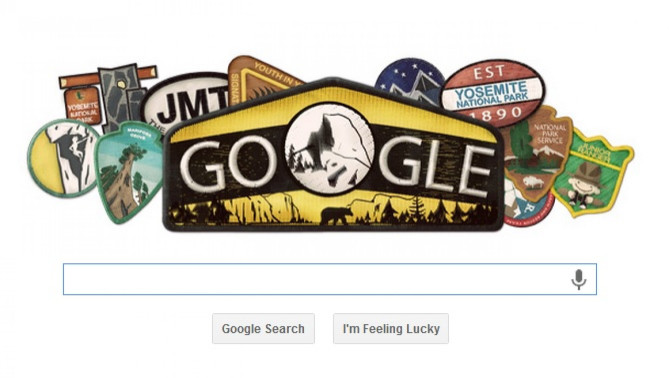Google Doodle Mocks Government Shutdown With A Timely Tribute To Yosemite National Park

Tuesday’s Google Doodle was designed to celebrate 123rd anniversary of Yosemite National Park, but ironically, the park -- as well as all 401 national parks -- are currently closed due to the government shutdown, which began Tuesday at midnight.
For those unfamiliar, the government shutdown was caused by Congress’ inability to settle on a government-funding bill after a long and drawn-out ping-pong match between the Senate and House Republicans fighting to strip away Obamacare. While national parks are closed during the government shutdown, other national security operations including Social Security and Medicare will continue as usual, and members of the military will continue to be paid.
The National Parks Conservation Association in late September warned about the dangers of a government shutdown, saying it would “put nearly 87 percent of Park Service employees – more than 21,000 staff members – indefinitely out of their jobs.” The group also noted that the last government shutdown, which lasted for 27 days between November 1995 and January 1996, cost local businesses $14 million per day, and the current government shutdown could cost businesses about $30 million a day.
In the case of Yosemite National Park, California’s Mariposa County suffered losses of $10,000 a day in tax revenue and saw 25 percent of adults out of work during the last government shutdown. Since visitation to Yosemite has increased since 1996, the impact of the current government shutdown on local tax receipts is expected to be much higher.
“A shutdown will affect as many as 750,000 visitors daily across all parks,” the Parks Association said. “October is peak season for many tourists who travel to see the changing autumn leaves; family trips to parks like Great Smoky Mountains, Blue Ridge Parkway, Golden Gate and Cape Cod will all be impacted. It is also peak wedding season in some parks, and many carefully planned events are now in jeopardy.”
The new Google Doogle may have been an accidental mockery of the current government situation, since many of the Google Doodles are designed ahead of time, but it could also be perceived as a pointed and timely critique of our political system. In the case of national parks, which are very close to Google’s headquarters in Mountain View, Calif., this government shutdown has a detrimental effect on the overall economy, since national parks support $31 billion in private-sector spending each year, and the National Park Service employs about 24,000 people and support roughly 252,000 private-sector jobs.
“Closing our parks is not only depriving visitors of an experience of a lifetime, it is also preventing park staff from monitoring and maintaining natural and historic resources throughout the park system,” the Parks Association said. “Staff biologists, ecologists and other resource professionals work to rid our parks of invasive species and to protect the threatened and endangered species that call our national parks home. Other staff members monitor grounds to prevent vandalism, illegal dumping, and other detrimental activities. While the shutdown allows for the most critical staff to remain, much of this work is being severely hampered by the government shutdown.”
Google may take some heat for the Doodle, but the search giant has created so-called controversial doodles in the past. In 2010, Google was accused of designing its Veterans’ Day Google Doodle to make the “e” in Google look like a crescent moon, which many people took as a reference to Islam. In April, Google celebrated Easter Sunday with a Doodle of Cesar Chavez, which was criticized because there was no mention of Jesus or his resurrection even though Google had never honored Jesus on any prior holiday, including Christmas or Easter.
“Doodles are the fun, surprising and sometimes spontaneous changes that are made to the Google logo to celebrate holidays, anniversaries and the lives of famous artists, pioneers and scientists,” Google says on its website.
© Copyright IBTimes 2024. All rights reserved.






















